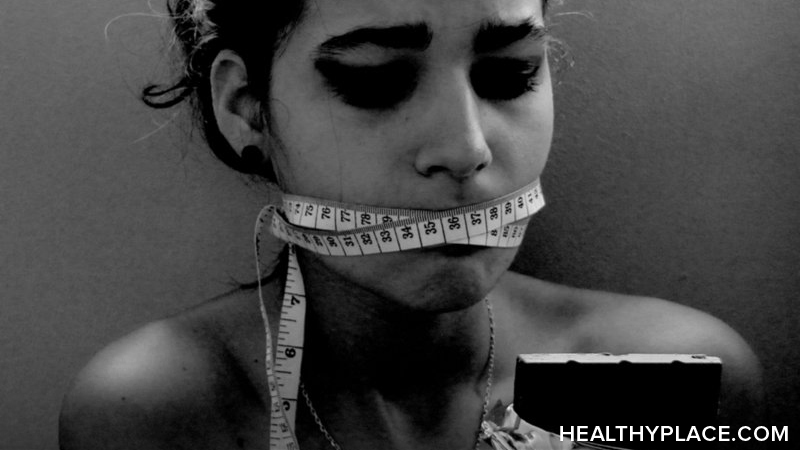
What is anorexia? It is the most deadly mental illness, and despite popular perception, it's not just about looking thin.
The patient never chooses anorexia. Families understand this in retrospect, after learning about anorexia, and what anorexia is, but that doesn't make it any easier to watch a family member starve herself, (signs of anorexia) and fade away into nothing. It's like a slow suicide, and although it accounts for more deaths than any other type of mental illness, the anorexia victim says she's okay, she's healthy.
She thinks her mind and body are just fine. But her brain has shrunk, and she's losing her cognitive skills (complications of anorexia). She's in denial about her anorexia. She says she's not like other anorexics, but she's moody and angry and depressed a lot of the time. Her heart has shrunk, too, and its resting rate has fallen to 49 beats per minute (60 to 80 beats per minute is considered healthy). When she's sleeping, her heart rate will fall well below the "critical" rate of 45 beats per minute, and she may not wake up again. She's seen doctors for problems with her kidneys, stomach, and other organs.
Before learning information about anorexia, and figuring out the basics of what anorexia is, it's difficult for families not to feel angry with the patient. They see her hurting herself and all of the people who love her. But she's not just a skinny, stubborn, vain girl who won't eat. She's sick, with a mental illness, and she didn't choose this any more than someone chooses cancer.
Information About Anorexia Causes
Anorexia - as all eating disorders - is a complex disease. There's not one single, simple cause for anorexia, although new research has revealed that anorexia and bulimia can be inherited conditions - one may have a genetic predisposition for them.
"But that doesn't mean that everybody who has that gene does have, or will develop, an eating disorder," says Kirstin Lyon, a marriage and family therapist in Carmel Valley who is also a certified eating disorder specialist.
So-called environmental factors can also trigger, and worsen, anorexia: our society's obsession with thinness, puberty, dieting, going away to college, a traumatic world event or a more personal one, like a breakup.
"There are usually about 10 other reasons why people get eating disorders," Lyon says, "and they all come together: control issues, perfection issues, also addiction. When all these things come together, it forms this way of coping. It's not about the food."
While most people who develop anorexia do so when they hit puberty, both Lyon and FitzGerald say they see patients of all ages. They say they treat 10 girls for every one boy.
At first, anorexia may look like body dissatisfaction. "'I want to go on a diet,'" Lyon quotes her patients. "Or food pickiness - 'I want to be a vegetarian.'"
Sometimes, it's even encouraged. Anorexia patients hear messages every day, such as "dieting and exercising are good for you" or "thin is beautiful."
"We live in a culture where we look at anorexic-thin models and call that normal, call that attractive," FitzGerald says. "We have lost our high level of suspicion for someone who is at low weight."
About Anorexia Treatment
The patient may be hospitalized. While in treatment for anorexia she may still insist she can get better on her own. And there are millions of other women - and men - like her in the U.S., walking skeletons, dying to be thin.
"Why won't she just eat the sandwich?" asks Dr. Cecily FitzGerald, an emergency physician who also treats patients with eating disorders, "Because she can no more eat that sandwich than you can eat that shoe."
"It's important to stress that it's not about the food, because parents, spouses, loved ones - they always feel it's just about the food. It's really not about the food."
A prime resource for anorexia information is The National Association of Anorexia and Associated Disorders. They note that the problem has reached epidemic levels in America, and affects everyone - young and old, rich and poor, women and men of all races and ethnicities. They cite seven million women and one million men sick with an eating disorder. More than 85 percent of victims report the onset of their illness by age 20.1
There are still a lot of misunderstandings about the disease, however, even among health professionals. Treatment is hard to find - few states have adequate programs or services to combat anorexia nervosa and bulimia - and it's also very expensive. Inpatient treatment for anorexia can cost about $30,000 a month, and outpatient treatment, including therapy and medical monitoring, can reach $100,000 per year or more.
"The treatment should be multi-disciplinary," FitzGerald says. "Therapy, a nutritionist, and a physician. Those are the minimum requirements, you can add to that physical therapy or art therapy. You can add as much as you see fit. But the bare-bones is the therapist/psychologist, a physician and a nutritionist."
About Anorexia Repercussions
By the time family or friends find out about the anorexia, much damage has already been done. Hair falls out, skin turns orange, or yellow, bones become weak and brittle, and the teeth and gums erode. In women, anorexia can cause menstruation to stop. The heart, kidney, liver, stomach and other organs become seriously damaged and start to shut down, while the brain may shrink, causing impaired thinking and reasoning.2
Anorexia causes mental and emotional repercussions, too. The disease can damage the patient's self-esteem, relationships and cognitive abilities. Family and friends may feel alienated, angry or saddened, causing damage to social and familial circles.
Anorexia Information: Recovery
"Weight restoration will return most everything to normal," FitzGerald says, indicating the possibility of recovering physical and bodily functions.
Lyon estimates that about one-third of anorexics recover, while another third may recover and then relapse, remaining symptomatic. The final third are chronic anorexics, constantly fighting the disease.
"Their life expectancy is shorter, or they will die," Lyon says.
The ones who recover can't do it overnight. It usually takes between two and nine years. Both Lyon and FitzGerald had eating disorders in their personal history, and both recovered, fueling the desire to help others people get well.
"There were so many times when I didn't want to go [to treatment]," Lyon says, "But I just had faith that things can change. If they can for me, they can for anybody."
About Anorexia and the Media
Both Lyon and Fitzgerald rail against the unrealistic body images on TV, in magazines and on the runways.
"It's very important for all of us - parents, teachers, men and women - to be accepting of our bodies," FitzGerald says. "I think this whole obesity epidemic is really dangerous; the amount of press that obesity is getting is leading to so much press for diets and it's such a dangerous, dangerous place to go. People need to eat what they want, when they want, and stop when they are satisfied."
It's also extremely important for parents to model body acceptance for their kids, she says.
"Then they aren't so susceptible to the media, to diets. It's important for parents to point out all the ways that our culture gets women to be unhappy with themselves. Don't say, 'Do these jeans make me look fat?' or, 'I can't have dessert; it will go straight to my hips.' It's that kind of stuff that children just can't hear. They need to know that they don't need thin thighs or a flat stomach to love their body."
FitzGerald talks to her daughter about airbrushing; in fact, the two have made a game out of it.
"We go through magazines and pick out where we think the model has been airbrushed. You take a woman who is already beautiful, and even the model can't achieve this level of perfection."
"Parents, teachers, babysitters, sisters, we need to all stand up and say, 'We are happy with ourselves, our bodies, the way they are.'"
article references









